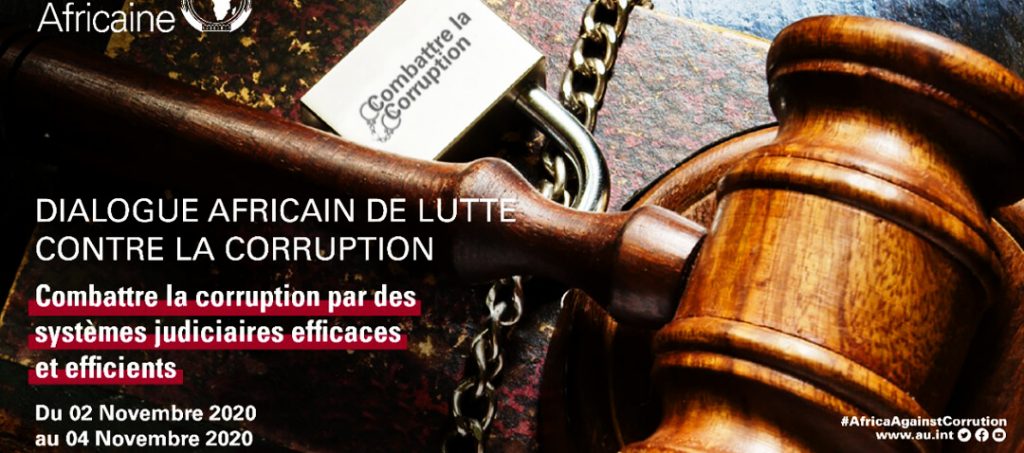

The 4th Annual African Anti-Corruption Dialogue
Theme: Fighting corruption through effective and efficient judicial systems
Date: 02 – 04 November 2020 (Online, Webinars)
Background
Corruption is a vice that impacts all areas of society. One area where the gravity of corruption is especially detrimental is when it permeates justice and accountability mechanisms. This can distort the application of the principle of the rule of law and give rise to impunity. It can also contribute to eroding public trust, create a culture of lack of accountability and weaken confidence in public institutions especially those that are meant to administer justice. It further impedes the capacity of judicial systems to guarantee the protection of human rights, creates uncertainty in the application of the law, and affects the responsibilities and duties of all those involved in the administration of justice.
In response to this challenge, there have been many measures to ensure that corruption is abetted in the administration of justice. Thus, some states have engaged in many reforms such as establishing courts specializing in economic and financial crimes while others have adopted processes to determine economic and financial crime cases.
Other reforms have included the establishment of integrity committees, specialized ombudspersons, and help desks to deal with reported instances of corruption, hotlines to respond to incidences of corruption as well as implementation of information, communication and technology tools to speed up judicial processes, enhance accountability and facilitate transparency. At the international level, regional and global networks have been formed to enhance accountability in the administration of justice and foster the exchange of best practices to mitigate the effects of corruption in the justice system.
While these efforts have been welcome, many challenges still exist to effectively ensure corruption can be controlled in the justice system. These include:
- Anti-corruption measures have largely been sectoral and have not focused on the wider administration of the justice chain; The perceptions about insufficient coordination between investigative, prosecutorial, and judicial arms that create inefficiency and delays in dealing with anti-corruption incidences;
- Perceived challenges in dealing with high-level corruption within agencies mandated to dispense justice;
- Perceptions about difficulties in dealing with political and grand corruption cases;
- Perceived delays in the finalization of corruption cases;
- Proportionality and enforcement of sentences; and
- Slow uptake in the utilization of information, communication, and technology tools across the administration of justice chain;
Objectives and expected outcomes
The African Union Advisory Board on Corruption is convening the 4th Edition of the African Anti-Corruption Dialogue on the theme “Fighting Corruption through Effective and Efficient Judicial Systems.” The Dialogue will engage and reflect on these developments through shared reflection and participation. It will bring together representatives of Member States, International Organizations, National AntiCorruption Agencies, Judiciaries, Investigative and Prosecutorial bodies, Civil Society, Academia, and other actors to reflect and discuss the topic.
The Dialogue will serve as a platform to develop policy recommendations for consideration by the policy organs of the African Union and other relevant actors.
The specific objectives of the dialogue shall be to:
- Convene stakeholders to brainstorm the topic;
- Identify challenges and bottlenecks in efficient and effective handling of corruption cases in the administration of the justice chain;
- Identify regional and international best practices to fight corruption through efficient and effective judicial systems; and
- Develop recommendations/strategies to inform stakeholders.
The expected outcomes of the Dialogue shall be:-
- Bolster relationships between investigative, prosecutorial, and judicial bodies in the fight against corruption
- Policy briefs; and
- Recommendations and strategies to be submitted to policy organs of the African Union and relevant stakeholders.
Format:
The Executive Director of the African Parliamentarians’ Network Against Corruption (APNAC) in the person of Mr. Fabrice FIFONSI, will be moderating the Webinar 3 that should carry out the reflections on the State of Anti-Corruption in Africa.
Together with the other panelists, the Executive Director will be reflecting on the initiatives and strategies adopted and the results they have yielded so far. They will deliberate on the challenges associated with anti-corruption efforts in Africa and explore new and innovative ways to overcome those challenges and recommendations will be made.
APNAC believes in the pertinence of this year’s theme and strongly supports that accountability and justice are key to the fight against corruption. Corruption can never end with an ineffective and impartial judicial.


Recent Comments